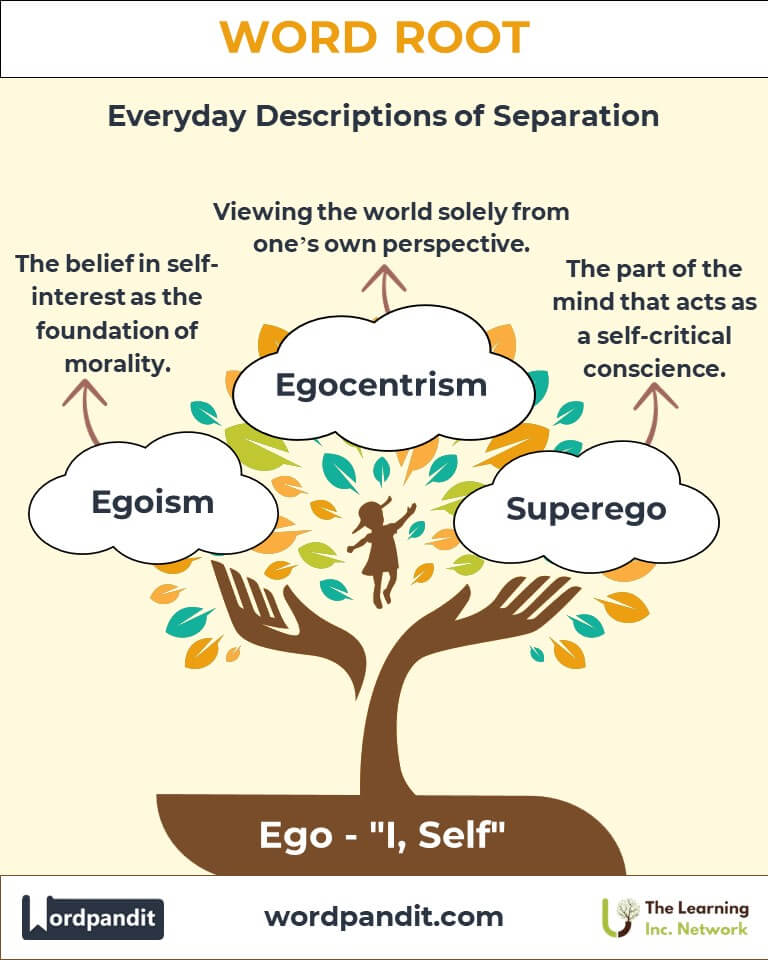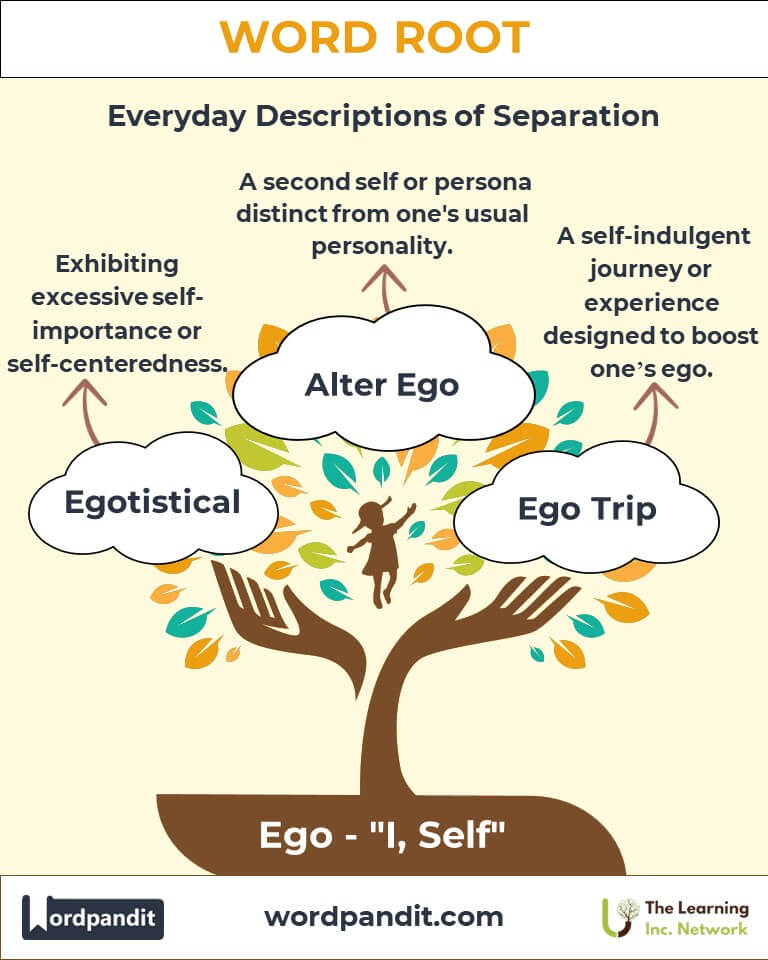Ego: The Center of Self in Language and Identity
Discover the profound influence of the root "Ego," derived from Latin, meaning "I" or "self." From psychology to philosophy and everyday language, "Ego" has become central to discussions about identity, self-perception, and individuality.

Table of Contents
- Introduction: The Essence of Ego
- Etymology and Historical Journey
- Mnemonic: Unlocking the Power of Ego
- Common Ego-Related Terms
- Ego Through Time
- Ego in Specialized Fields
- Illustrative Story: Ego in Action
- Cultural Significance of the Ego Root
- The Ego Family Tree
- FAQs about the Ego Word Root
- Test Your Knowledge: Ego Mastery Quiz
- Conclusion: The Living Legacy of Ego
Introduction: The Essence of Ego
The term "Ego," pronounced "ee-go" or "eh-go," represents the self or "I." Originating from Latin, this powerful root has permeated psychology, philosophy, and everyday discourse. Whether discussing an egotistical individual or the balance of the ego in Freudian theory, the root "Ego" reveals the depth of human self-awareness and individuality.

Etymology and Historical Journey
The root "Ego" comes directly from the Latin pronoun for "I." Ancient Romans used "ego" to emphasize the speaker’s perspective. Over time, it found its way into philosophical discourse, particularly through Descartes' famous declaration, Cogito, ergo sum ("I think, therefore I am"). Freud later solidified its prominence in modern psychology, using "ego" to describe the conscious self balancing internal desires and external reality.
Mnemonic: Unlocking the Power of Ego
To remember "Ego," picture a mirror reflecting a person pointing to themselves, saying, "That’s me!"
Mnemonic Device: “Ego reflects the self, the 'I' that sees and knows itself.”
Common Ego-Related Terms
- Egotistical: Self-centered or excessively self-absorbed. Example: "Her egotistical behavior alienated her friends."
- Egoism: A philosophy prioritizing self-interest. Example: "Egoism suggests that individuals act out of self-interest."
- Egocentric: Viewing the world solely from one’s own perspective. Example: "Children are naturally egocentric as they develop social awareness."
- Superego: In Freudian psychology, the ethical component of personality. Example: "His superego made him feel guilty about his actions."
- Alter Ego: A second self or alternate personality. Example: "The superhero’s alter ego worked as a mild-mannered journalist."
Ego Through Time
Egoism: In the 17th and 18th centuries, egoism emphasized the rational pursuit of self-interest, evolving into debates about morality.
Egotism: By the 19th century, the term gained prominence to describe self-absorption, contrasting the ethical implications of egoism.
Freudian Ego: In the 20th century, Freud’s psychoanalytic theory revolutionized the concept, positioning the ego between the id (desires) and superego (morality).
Ego in Specialized Fields
- Psychology: Ego Defense Mechanisms help the ego cope with stress.
- Philosophy: Egoism debates the role of self-interest in morality.
- Sociology: Egocentrism examines individual perspectives in social contexts.
- Literature: Alter Ego explores dual identities in characters.
Illustrative Story: Ego in Action
Sam, a talented artist, often struggled with egotistical tendencies, overshadowing his collaborative projects. During a critical exhibition, a friend’s feedback helped him balance his ego with humility, improving his relationships and artistic impact. The experience illustrated the dual nature of ego: essential for self-expression yet needing balance for harmony.
Cultural Significance of the Ego Root
The concept of ego spans cultures, influencing art, religion, and societal values. In Eastern philosophies like Buddhism, the ego is seen as an illusion to overcome, while Western traditions often emphasize its role in individuality and personal growth. The dualities of ego—self-importance and self-awareness—reflect universal human struggles.

The Ego Family Tree
- Auto- (self): Autonomy (independence), Automaton (self-operating machine).
- Self- (English prefix): Self-esteem (confidence), Self-centered (focused on oneself).
- Id- (Freudian root): Idiosyncratic (unique to self).

FAQs About the Ego Word Root
Q: What does "Ego" mean?
A: "Ego" originates from Latin and means "I" or "self." It represents individuality, self-awareness, and personal identity in language and psychology.
Q: How is "Ego" different from "Superego" in Freudian theory?
A: In Freud’s model, the ego mediates between the impulsive id and the moral superego. The ego ensures realistic decision-making, while the superego enforces ethical and societal standards.
Q: Is "Egoism" always negative?
A: No, egoism can emphasize rational self-interest, which isn’t inherently negative. Ethical egoism argues that prioritizing oneself can indirectly benefit others, unlike egotism, which involves excessive self-importance.
Q: What is an "Alter Ego"?
A: An alter ego is a secondary self or persona representing a different aspect of one’s identity. It’s seen in creative contexts (e.g., pseudonyms) or psychological studies of dual identities.
Q: What is the role of "Egocentrism" in child development?
A: Egocentrism in children is a natural developmental stage where they view the world solely from their perspective. It diminishes as they develop empathy and social awareness.
Test Your Knowledge: Ego Mastery Quiz
1. What does the root "Ego" signify?
2. What is the Freudian "Ego"?
3. What does "Egocentric" mean?
4. Which term describes a second self?
5. What does "Egotistical" imply?

Conclusion: The Living Legacy of Ego
The root "Ego" is a cornerstone of language and thought, capturing the essence of selfhood and individuality. From philosophical musings to psychological frameworks, it continues to shape our understanding of identity and human nature. As society evolves, so does the conversation around the ego, ensuring its relevance for generations to come.













